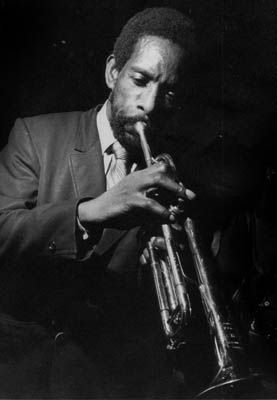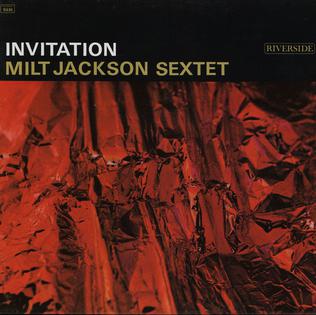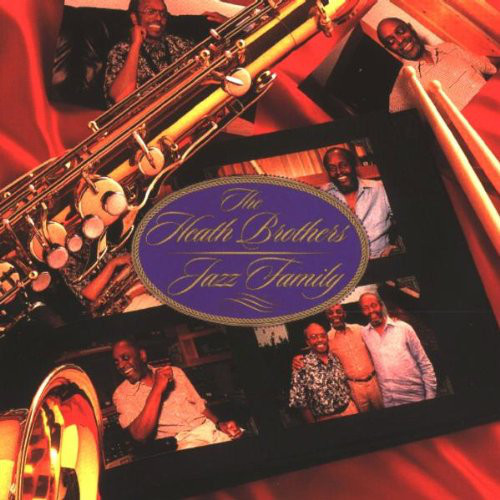None Shall Wander – Kenny Dorham
A beautiful minor-key song with a Latin 12/8 feel. Full Score and parts are available for the sextet arrangement from the original recording.
- Recording: Milt Jackson - Invitation
- Recorded on: October 31, 1962
- Label: Riverside (RM 446)
- Concert Key: E-flat minor
- Vocal Range: , to
- Style: Latin 12/8 (medium)
- Trumpet - Kenny Dorham
- Tenor Sax - Jimmy Heath
- Vibes - Milt Jackson
- Piano - Tommy Flanagan
- Bass - Ron Carter
- Drums - Connie Kay
Video
- Description
- Historical Notes
- Solos
- Piano Corner
- Bass Corner
- Drum Corner
- Guitar Corner
- Inside & Beyond
- Minus You
Beautifully melodic with a slightly mysterious feeling, this song is one of the few Kenny Dorham compositions with a 12/8 Latin groove. The non-repeating form is 22 measures long, with a 12-measure A section using the Latin groove followed by a 10-measure B section where the rhythm section plays a swing 2-feel, returning to the 12/8 feel for the last two measures. The changes are in a classic K.D. style—logical and tastefully crafted, with a few unexpected twists that all get resolved by the end. Solos are on the same form as the head, swinging throughout with a 4-feel; the solo changes have a few different passing chords.
As shown in our lead sheet, the original recording has an intro based on the last four measures of the head. In a clever mirroring of this intro, the coda is based on the first eight measures of the head—vamping two more measures to a final hit. The changes of this coda are slightly different from the head, with a modulation to E major in the fourth measure giving an extra depth to the melody: the melody note B♭ here, the fifth of E♭ minor on the head, becomes a sharp 11th on the E chord.
A Full Score and parts are available for the recorded sextet arrangement. This recording is four choruses long, with one solo chorus each for vibes and tenor sax between the in and out heads. The vibes is the 1st part; trumpet and tenor play backgrounds through the intro and head, and there is a second chorus of backgrounds for the vibes solo. The changes for the tenor solo chorus are shown as an open solo section in our score and parts. On the out head the trumpet has the melody (without backgrounds) at A, with vibes back on the melody at B. The background figures sometimes go higher than the melody; this can definitely work with a horn player instead of vibes on the melody, but in some places our tenor 2nd part is written an octave lower than where it's played on trumpet in the recording to avoid obscuring the melody.
As shown in our lead sheet, the original recording has an intro based on the last four measures of the head. In a clever mirroring of this intro, the coda is based on the first eight measures of the head—vamping two more measures to a final hit. The changes of this coda are slightly different from the head, with a modulation to E major in the fourth measure giving an extra depth to the melody: the melody note B♭ here, the fifth of E♭ minor on the head, becomes a sharp 11th on the E chord.
A Full Score and parts are available for the recorded sextet arrangement. This recording is four choruses long, with one solo chorus each for vibes and tenor sax between the in and out heads. The vibes is the 1st part; trumpet and tenor play backgrounds through the intro and head, and there is a second chorus of backgrounds for the vibes solo. The changes for the tenor solo chorus are shown as an open solo section in our score and parts. On the out head the trumpet has the melody (without backgrounds) at A, with vibes back on the melody at B. The background figures sometimes go higher than the melody; this can definitely work with a horn player instead of vibes on the melody, but in some places our tenor 2nd part is written an octave lower than where it's played on trumpet in the recording to avoid obscuring the melody.
Four months before the "Invitation" sessions, Kenny Dorham recorded on two nonet sessions led by Milt Jackson. These unfortunately have been lost; they include the only recording of Tadd Dameron's Sando Latino, before trumpeter Joe Magnarelli finally gave that song its debut in 2018.
"Invitation" is one of the few recordings featuring Kenny alongside bassist Ron Carter; they also played together with tenor saxophonist Rocky Boyd and pianist Toshiko Akiyoshi. Jimmy Heath had recorded with K.D. on two of the latter's albums, "Kenny Dorham Quintet" and "Showboat."
"Invitation" is one of the few recordings featuring Kenny alongside bassist Ron Carter; they also played together with tenor saxophonist Rocky Boyd and pianist Toshiko Akiyoshi. Jimmy Heath had recorded with K.D. on two of the latter's albums, "Kenny Dorham Quintet" and "Showboat."
Related Songs
Email Send None Shall Wander to a friend
Send this page to a friend via email. Add your name or email in the first field. In the second, add one or more email addresses, separated by a comma.
- Recording: Heath Brothers - Jazz Family
- Recorded on: May 29-31, 1998
- Label: Concord Jazz (CCD 4846-2)
- Concert Key: E-flat minor
- Vocal Range: , to
- Style: Latin 12/8 (medium)
- Trumpet, Flugelhorn - Tom Williams
- Soprano Sax - Jimmy Heath
- Guitar - Tony Purrone
- Piano - Jeb Patton
- Bass - Percy Heath
- Drums - Tootie Heath
Video
- Description
- Historical Notes
- Solos
- Piano Corner
- Bass Corner
- Drum Corner
- Guitar Corner
- Inside & Beyond
- Minus You
Jimmy Heath, who had played on the original recording of this song, with vibist Milt Jackson, revisits it here with his brothers in a rather different arrangement. The rhythm section plays a 12/8 groove throughout, never going to swing; there is a vamp intro instead of the original written intro, and also a vamp coda. Soprano sax, muted trumpet, and guitar double the melody in unison; the phrasing is slightly different in places, as are the changes. The form is extended to 24 measures, with two extra measures of E♭ minor at the end. A notable difference in the chord progression is the inclusion of Emaj7 in the fourth measure of each chorus, as in the original coda. In the solo choruses, this chord is set up with F7 in the previous measure.
Lead sheets are available here—click on the Milt Jackson "Invitation" album cover (left) for the sextet arrangement (Full Score and parts) used on Milt's album..
Lead sheets are available here—click on the Milt Jackson "Invitation" album cover (left) for the sextet arrangement (Full Score and parts) used on Milt's album..
The lineup for this album lists three different trumpeters—Tom Williams, Joe Wilder, and Earl Gardner—without specifying who plays on which track; aural evidence suggests that None Shall Wander features Williams.
"Jazz Family" is the third Heath Brothers album to feature one song by Kenny Dorham. Their 1978 album "Passing Thru" includes their version of Kenny's Prince Albert, while 1981's "Brotherly Love" (without Tootie Heath) has a version of No End..
"Jazz Family" is the third Heath Brothers album to feature one song by Kenny Dorham. Their 1978 album "Passing Thru" includes their version of Kenny's Prince Albert, while 1981's "Brotherly Love" (without Tootie Heath) has a version of No End..
Related Songs
Email Send None Shall Wander to a friend
Send this page to a friend via email. Add your name or email in the first field. In the second, add one or more email addresses, separated by a comma.

Kenny Dorham
August 30, 1924 – December 15, 1972
August 30, 2025, is Kenny Dorham's 101st birthday: jazzleadsheets.com has added many new K.D. compositions. Jazz At Lincoln Center has dedicated three late-night sets to Kenny's music, played with love by young musicians who want his music to live on. Join in, play K.D. music! Read more...
There was a problem.
...


